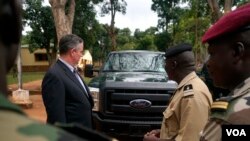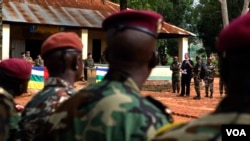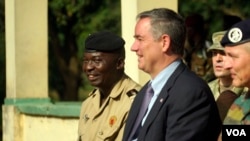At a ceremony this month, the U.S. ambassador to the Central African Republic turned over the keys to four cargo trucks to the national army. It was the first installment of $8 million worth of nonlethal assistance that is expected to include 16 more trucks and communications equipment.
"Essentially, we want to help the various processes that will allow this country that has known some really difficult times to pull out of that crisis and move into something sustainable, something safer for the region and ultimately safer for the American people as well," U.S. Ambassador Jeffrey Hawkins told VOA. "Because if there is glaring instability, even in a place that is remote like C.A.R., that does not serve American interests."
A rebel coup in 2013 plunged the C.A.R. into chaos. In the countryside, armed militias continue to fight over mineral resources and trade routes. Bandits and other groups like the Lord's Resistance Army also take advantage of the poor security situation.
The national army, known as the FACA, is being rebuilt from scratch with training from the European Union.
The FACA deputy chief of staff for planning, Lieutenant Colonel Ishmael Koagu, said the troops do not have the capacity to intervene directly and are in the process of training and increasing their strength.
The FACA has a limited supply of weapons as a result of an arms embargo by the U.N. Security Council. Analysts warn it may be years before the army is combat-ready and can take back control of the country.
U.N. peacekeepers
Meanwhile, there is the U.N. peacekeeping mission, MINUSCA, a force of about 12,000. The United States is the largest donor to MINUSCA. In Washington, the Trump administration has proposed cutting back U.S. funding for the $8 billion U.N. peacekeeping budget.
In Bangui, Hawkins told VOA he wasn't sure whether MINUSCA would be affected. "The president has made clear that he is interested in a U.N. that is more efficient, that performs optimally," he said.
Advocacy groups warn that an abrupt drawdown of U.N. troops in the C.A.R. could endanger civilians.
The U.S. ambassador said he remained "very supportive" of MINUSCA, "but [we] do not want it to be a permanent mission. We want it to be a temporary one, and the way to make it a temporary one is to build in situations that can take care of security concerns."
The United States has also announced it is withdrawing its troops from a regional task force hunting the Lord's Resistance Army.
About 100 U.S. military members have been deployed to the C.A.R., South Sudan, the Democratic Republic of the Congo and Uganda since 2011 to track the armed group and try to bring its leader, Joseph Kony, to justice.
Last month, the U.S. Africa Command chief called Kony and his troops "irrelevant." AFRICOM said the LRA had been reduced to under 100 fighters.






